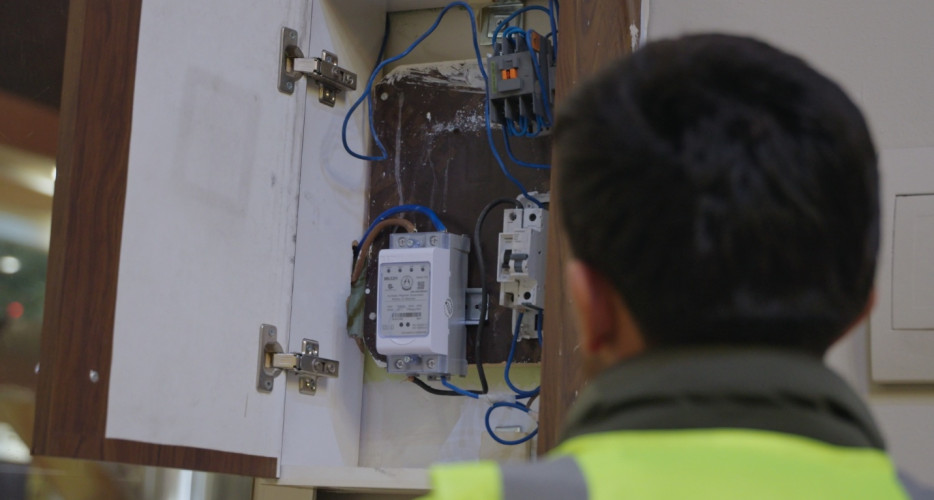
Peregraf- Ghamgin Muhammed
Tanya Mahmoud’s house no longer glows with light the way it used to. The brightness of multiple bulbs has dimmed. Yet, she is adjusting, consciously cutting down her electricity usage as part of a new lifestyle prompted by the Kurdistan Region’s ambitious "Runaki" (Lighting) project.
"I’ve restricted the use of electrical appliances and lights. I turn off the lights in rooms we don’t need," she said. "The children keep saying the house is dark—but they’re still getting used to it."
Tanya, who lives in an eastern neighborhood of Sulaimani, is among the many residents who have recently been connected to the government’s 24-hour electricity supply. The project, launched a year ago, aims to provide continuous national electricity to all citizens in the Kurdistan Region by the end of 2026.
The "Runaki" initiative is reshaping not only the power supply but also the way people live, consume, and budget for electricity. For Tanya, it’s a matter of adapting. "Now I only use electricity as needed," she told Peregraf.
Power and Price
Since its launch, the project has sparked widespread discussion across Kurdish households—especially about pricing. The new system does not offer a fixed limit of power usage. Instead, citizens pay based on consumption: the more they use, the more they pay.
The government says the initiative is part of a broader push for modernization. "Runaki is a national project led by the Ministry of Electricity," the KRG claims. However, the cost remains a point of contention for many.
"Believe me, it used to be frustrating," Tanya said. "You had to wait for the power to come back on to get anything done. Now I can run appliances whenever I want."
Private generators, which have supplied electricity to citizens since the 1990s due to chronic power shortages, are slowly being phased out. The Ministry of Electricity reports that over 7,000 generators will be shut down as the lighting project expands—potentially reducing environmental pollution and health risks, including cancer.
Appliance Market Shifts
The transition to 24-hour electricity has created a ripple effect in the market. Retailers say consumer behavior is changing fast. Shoppers now ask not only about the price of appliances but how much electricity they consume.
"Low-electricity appliances have become a major selling point," said Sardar Khalil, a salesperson at an electronics exhibition in Sulaimani. "People used to buy based on price. Now they ask how much power a device needs."
Some devices, such as inverters or energy-efficient heaters, are more expensive but consume significantly less electricity. Talar and her mother, who haven’t yet received 24-hour electricity in their west Sulaimani neighborhood, were shopping for a low-power electric lighter.
"There’s been so much talk about electricity bills that we’re preparing early," Talar said. Her mother added, "It’s better to pay more once for a good appliance than keep paying high bills every month."
Challenges of Quality and Infrastructure
Experts, however, raise concerns about the quality of appliances in the market. Kamal Saeed, an electrical engineer, told Peregraf, "Many of the devices imported to the Kurdistan Region lack proper quality control. They are inefficient and don’t meet minimum energy standards."
He advises households to invest in high-quality inverters and energy-saving devices, clean filters and heaters regularly, switch to LED bulbs, and consider gas heaters for winter to reduce electric bills.
According to the Ministry of Electricity, over 2 million citizens and more than half a million subscribers—representing about 30 percent of the Kurdistan Region’s population—are now connected to the new system.
Still, not all promises have been delivered. One major component of the Runaki initiative includes coordination with the Central Bank of Iraq to offer financial support for installing solar panels, efficient boilers, or alternative energy solutions. Yet, no significant progress has been made.
"No such steps have been taken so far," confirmed Sirwan Mohammed, spokesman for Sulaimani’s electricity directorate. "However, our teams continue to implement the lighting project across all neighborhoods."
Tiered Electricity Pricing
The tiered pricing system introduced by the KRG has been the most controversial element of the project. Despite protests and appeals for reductions, the government ultimately set the following household rates:
-
0–400 kWh: 72 dinars per kWh
-
401–800 kWh: 108 dinars per kWh
-
801–1200 kWh: 175 dinars per kWh
-
1201–1600 kWh: 265 dinars per kWh
-
Over 1600 kWh: 350 dinars per kWh
For commercial and industrial use, the rates are:
-
Commercial: 185 dinars/kWh
-
Agricultural: 60 dinars/kWh
-
Industrial: 160 dinars/kWh
-
Large industry: 125 dinars/kWh
-
Government buildings (Miri): 160 dinars/kWh
The Runaki project was officially announced in October 2024 by Prime Minister Masrour Barzani during a visit to a neighborhood in Erbil, where electricity teams had already been working on its implementation for three months. The initiative aims to deliver 24-hour electricity to all households and businesses across the Kurdistan Region by the end of 2026.
Until then, families like Tanya’s are learning to balance comfort, necessity, and cost—one light switch at a time.